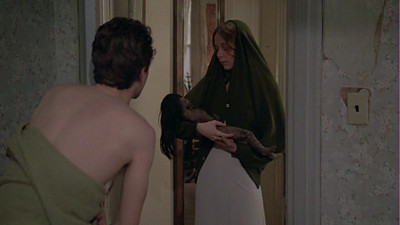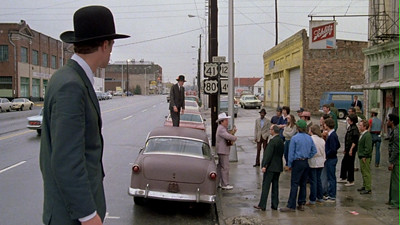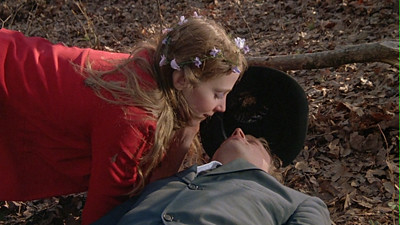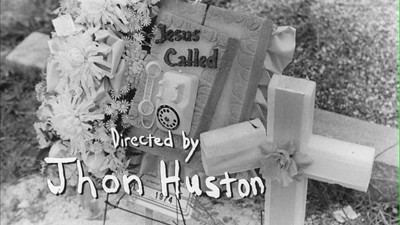
We all have "ah-ha" moments in life, some important, some trivial. In terms of the trivial, one of mine was the first time I watched Wise Blood and realized at long last where the sample of the above quote used in Ministry's industrial psychobilly rave-up "Jesus Built My Hotrod
John Huston's 1979 adaptation of the Flannery O'Connor novel

O'Connor's Wise Blood pulls a dual trick: it is on one hand a scathing portrayal of how modern religion is distorted and how the hungry lambs of Christ are eager to gobble it up and be fooled, and on the other hand, it is a sympathetic portrait of a true believer, however misguided he may be. Hazel Motes is an odd and complex character, full of contradictions, walking and talking his internal conflict like it's the only thing he has in the world. The casting of Brad Dourif as the would-be street corner preacher was a perfect coupling of actor and role. It's one of those performances where, once you see it, it's impossible to imagine anyone else playing the part or even to see Dourif doing anything else. For as great as he was in One Flew Over the Cuckoo's Nest
Wise Blood was published in 1952, and it portrayed a post-War American South that the industrial age has all but abandoned. Huston updates the story in so much as he doesn't really set it in any specific timeframe. Cars, clothes, and locations bear some resemblance to the late '70s, but the true setting is one of those unchanging out of the way 'burgs one can find all across the U.S. They are of every age and of none.
Hazel returns to the area of his birth following a stint in the army. He is eager to discard his uniform and his service, only willing to note that he was discharged due to injury but unwilling to disclose how he was injured, implying that it was in a place too embarrassing to mention. Whatever it was, it has forever changed him, and he's eager to move on, buying a new suit and heading for a new town, loudly proclaiming that he wants to experience new things he's never experienced before. It's almost like advertising copy. "New! New! New!" In contrast, there are billboards and marquees all over the place declaring the old gospel, the message of Protestant morality that is being pushed at Hazel and the one he wants to reject.
Once Hazel gets to where he's going, a strange group of characters starts to congregate around him. If he is the new Messiah, these are his mental ward disciples. One man becomes his sort of nemesis, the blind street preacher Asa Hawks (Harry Dean Stanton). Though obviously a charlatan, Hawks picks up on the signs that Hazel has a dark past that has made him angry with religion. We see some of this as flashbacks, with the director Huston appearing as Hazel's grandfather, a fire-and-brimstone preacher who peddled his wares in revival tents when Hazel was just a boy. Hawks declares that Hazel is either marked to be a preacher or some other preacher has placed his mark on him, and he insists Hazel is drawn to him to put things right. It's a father/son scenario in its way, with Hazel's rebellion being like the angry teenager who wants to rebuke his own heritage.

There is something amusingly adolescent about all of Hazel's rejections. His constant insistence that he believes in nothing reminding me both of earnest punk rock sloganeering and the hilarious nihilists from The Big Lebowski. Hazel decides to give Hawks a run for his money, and he sets up his own church, The Church of Truth without Christ, a new denomination of Christianity where there is no Jesus, no sin, no forgiveness. There is only each and every man, the savior of himself.
Keep in mind that all of this is presented with the blackest of tongues pressed firmly into the darkest of cheeks. While Hazel treats his mission with deadly seriousness, Huston does anything but. One of the main things that the director, along with screenwriters Benedict and Michael Fitzgerald, draws from O'Connor is that much of modern religion is a side show. The better your pitch, the more freakish your display, the more likely you are to get an audience. Hence, Hawks having blinded himself with quick lime to prove his belief. In the flashbacks, we also see that Hazel's grandfather set up shop with traveling carnivals, and Hazel snuck over from the preaching tent to see the naked woman in a coffin in one of the neighboring tents (thus, sex and death and a repentant soul are all linked in the boy). Likewise, we get the modern church of the motion picture, and the bizarre spectacle of Gonga, Monarch of the Jungle. Merely a man in an ape suit, he suffers the little children unto his church so they can bear witness to his onscreen pilgrimage, apparently emerging from the wicked wilderness to sell tickets.

Gonga in the film version of Wise Blood is both one of the film's most potent symbols as well as part of one of its most pronounced foibles. The movie ape is part of a side story with Hazel's most fervent follower, the dumb-as-wood Enoch Emory (Dan Shor). Another country boy adrift in the city, Enoch is desperate enough for friends to keep chasing Hazel around despite the angry man's constant abuse. In one of the funniest scenes in the movie, Enoch stands in front of the monkey cage at the zoo where he works hurling insults at the monkeys. Shor's posture is deliberately chimp-like, and it's ironic that he will eventually embrace what he hates. After he sees how easily Gonga makes friends, the boy steals the gorilla suit and runs around town trying to shake people's hands, finding connection at last.
Unfortunately, much of the comedy in the Enoch scenes is too broad. The lowest point is when he dons a wig and prop moustache to steal a shrunken man from the museum, believing the relic of a savage land to be the perfect idol for Hazel's church. I assume Huston is intentionally emphasizing the silliness of the scene, playing up Enoch's place in the story as the idiot seer (he's the one with "wise blood," a self-proclaimed ability to read signs and symbols). Huston stages his activities like segments of a Keystone Cops film, but these scenes end up looking clumsy and amateurish. They are incongruous to the heavier satire of the main plot. This isn't helped by Alex North's score, which is largely variations on the song "Tennessee Waltz," played on everything from a banjo to modern synthesizers. It's a fine idea, fitting some of the ideas the film wishes to illustrate in terms of how modernity and tradition are clashing, but like so many of the more technologically "progressive" movie soundtracks of the late '70s and early '80s, it ends up being the one thing that really dates Wise Blood.

Hazel Motes is definitely a man out of time, though. He is neither part of the old Southern tradition, nor does he fit in the new world. His is the plight of the existential philosopher in a world sticking to medieval mythology. Again, it's that idea of modernity versus tradition. What's the new God in a technological world? Why, a fine automobile, of course! Hazel sees his car as his mode of delivery, the chariot that will take him away from his earthly problems; the rest of the world looks at his car and sees it is breaking down, but he insists he will keep in running, it will get him where he needs to go. He doesn't care if he is trading one junk heap of belief for another, religion makes all men blind if they so desire--and in some cases in this story, literally.
In fact, both O'Connor and Huston want to show how easy it is to replace a prophet, be it Enoch's false idol or Hazel replacing Asa Hawks, and then Hazel being replaced in turn. One of the best sequences in Wise Blood comes when Ned Beatty shows up as Hoover Shoates, another religious con man who spots a good partner in Hazel. When Hazel refuses to go along and let his Church of Truth without Christ be co-opted, Hoover gets another man (William Hickey) with his own car to dress up like Hazel and be his prophet for the slightly altered, contradictory Church of Christ without Christ. Add an acoustic guitar, and they've got a better show than their inspiration, and Hazel is practically out of business.

The ironic problem with Hazel is that for all the bunk he is peddling, he is the only true honest man in all of Wise Blood. He actually believes his own b.s. This adds a level of tragedy to his comic downfall, and it's something that Dourif is particularly skilled at portraying. The actor uses his skinny, almost frail body and juxtaposes it with an intense manner. Hazel is an angry character, unyielding in his conviction. As a result, he often misses the human connections offered to him, be it Enoch's friendship or the landlady (Mary Nell Santacroce) who wants to take care of him at the end of the movie. His only real relationships, surprisingly enough, are sexual ones, first with the prostitute he goes to when he first gets to town and then with Hawks' maybe-daughter, Sabbath Lily (Amy Wright).
Sabbath Lily is arguably Hazel's Eve, though her seduction in the garden ends up being her failed come-on in a grotty forest. Their coupling adds to the element of tragedy, though it is more Greek than it is Christian. When Hazel takes the girl from her father, who is also his surrogate father, the outcome is both inevitable and Oedipal. Hazel's old-world penance is right out of Sophocles.

It can be hard sometimes to know for sure whether certain style decisions are intentional or whether or not they are just how things turned out. In this case, I don't know if the low-rent look of Wise Blood was deliberate on John Huston's part (the man did allow his name to be misspelled in the hand-scrawled credits) or if it was just a matter of budget, but either way, the film's rundown appearance perfectly fits the setting. As I noted, the towns Hazel visits have been all but abandoned by the rest of the country. They are as behind the times in their appearance and conveniences as they are in their ideas (many of the characters, including Hazel, make no secret of their racism). Much of the film takes place outdoors, but there is a perpetual gray pallor over everything, like the skies are permanently overcast. The new Criterion DVD is light years better than any of the old VHS copies I had seen prior, showing every crack, every faded patch of paint. These folks may be stuck where they are, unable to move forward, but they aren't immune to decay.
That timelessness ultimately works in favor of Wise Blood, which is one of the stranger films of John Huston's extensive career, to be sure. As I said, the only real failings come when he attempts to contemporize things. If only folks back then knew that synthesizer music came with an expiration date, they would have likely avoided it. Sometimes I feel like a broken record (there's a dated reference!) in pointing out how old films have a poignancy to our current political situations, but Wise Blood strikes as close to home now as it likely did when O'Connor first wrote her novel. Returning vets, economic hardships, overzealous religious zealots competing for who has the bigger belief--seriously, how is it that we never learn? Hazel Motes tried to teach us, but we wouldn't listen. Does that mean his failure is our own?


1 comment:
For the record, the scene in O'Connor novel where Enoch is hurling insults to the gorilla includes my favorite line of the story:,"For Enoch, the opportunity to insult a famous gorilla could have only come from the hand of providence."
Post a Comment